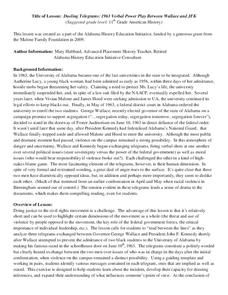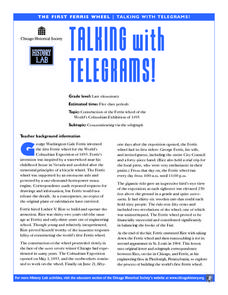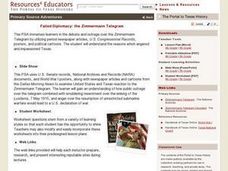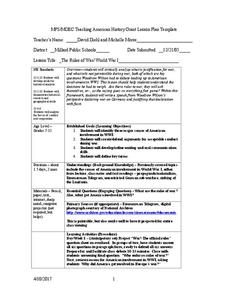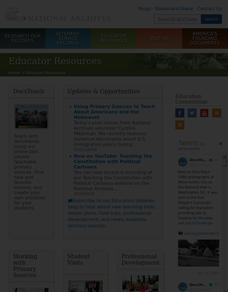Alabama Department of Archives and History
Dueling Telegrams: 1963 Verbal Power Play Between Wallace and JFK
Information, inferences, and innuendos. Text and subtext. Class members examine telegrams exchanged between President John F. Kennedy and Alabama Governor George Wallace, studying both what is stated and what is implied by the...
DocsTeach
The Zimmermann Telegram
An enlightening activity explains how a telegram prompted the United States to enter World War I. Scholars examine the telegram and work to decode it. To finish, individuals complete a worksheet and participate in group discussion to...
Curated OER
Telegrams!
Young scholars read and analyze original telegrams to learn about people involved in and process of building the world's first Ferris wheel, examine correspondence between inventor and engineer to understand planning necessary to build...
Loudoun County Public Schools
World War I Causes Project
After completing this detailed and well-designed project, your young historians will be well-versed in their explanations of the reasons that various countries joined World War I! Learners design a picture book covering seven primary...
Curated OER
Global Conflict
Examine the effects and interesting facts regarding global conflict during WWI. Topics covered include The Lusitania, Zimmerman Telegram, the collapse of central powers, and John Pershing. Slides include informative text and images in a...
Curated OER
Failed Diplomacy: The Zimmerman Telegram
Seventh graders continue their examination of World War I. In groups, they read a copy of the famous Zimmerman telegram and discuss its effect on Americans. To end the activity, they discuss how public opinion changed after it became...
US National Archives
WWII: Western Europe 1939-45 – End of the War
You are Winston Churchill, and on May 9th, 1945, you receive millions of grateful cards and telegrams. How do you respond? High schoolers put themselves in the Prime Minister's chair with an activity that prompts them to respond to a...
Curated OER
The Zimmermann Telegram
Young scholars decode a fictitious message and write messages using the code. Students are shown the significance of the creation of the Zimmermann telegram to aid in communication and how it altered history.
Curated OER
Telegram from Senator Joseph McCarthy to President Harry S. Truman
High schoolers research the McCarthy hearings to determine the following: time frame of hearings, how they were broadcast, how the press reacted, and how the American people reacted in light of the Korean Conflict and the Cold War.
US National Archives
Eastern Europe 1939-45 — Camps
Britain's decision not to bomb German death camps in World War II has provided many questions for historians, but with a primary source analysis lesson, high school students may be a step closer to finding out the truth. Learners read...
US National Archives
Eastern Europe 1939-45 — Ukraine
Was Joseph Stalin desperate or exaggerating the USSR's need for assistance on the Eastern Front in 1942? History students examine two differing opinions on Stalin's position and the reality of the Eastern Front just three years before...
National Endowment for the Humanities
Chronicling America: Uncovering a World at War
As part of a study of World War I, class members read newspaper articles from the time that urge American involvement, non-involvement, or neutrality. Using the provided worksheet, groups analyze the articles noting the central argument...
Curated OER
Letters, Telegrams, and Photographs Illustrating
Students research the factors that are important in winning a battle in the Civil War. In a second activity they are assigned the role of a specific type of person during the Civil War and asked to describe what it's like being that person.
Curated OER
The July Crisis: Can You Stop the Great War?
Students role-play as diplomats from countries involved in World War I who have received telegrams stating they must prepare presentations on their country's position about the war. They have 45 minutes to reach a peace accord, or they...
Curated OER
The Rules of War/World War I
Students explore the reasons the United States became involved in World War I. In this World History instructional activity, students research the reasons Woodrow Wilson made the decisions he did, prepare a debate and write a paper.
Curated OER
Telegram from Senator Joseph McCarthy to President Harry S. Truman
Students research Senator Joseph McCarthy's February 9, 1950 speech, given at Wheeling, West Virginia, in which he claimed more than 200 State Department employees were members of the Communist Party.
Curated OER
Truman and MacArthur
Students discuss and fill out a chart on how President Truman fired General MacArthur. In this Truman and MacArthur lesson plan, students study telegrams, letters, and other documents, and fill in a chart about supporting or not...
Curated OER
Reasons for the United States Entry into World War I
In this World War I learning exercise, students complete a graphic organizer with details about the U.S. neutrality, German submarine warfare, and the Zimmerman telegram.
Curated OER
The U.S. Recognition of the State of Israel
Students research the political aspects of the U.S. position in the Middle East, considering, for example, Truman's position in view of the 1948 presidential election. They examine a telegram sent by the Secretary of State, George C....
Curated OER
Evaluate Causes of U.S. Involvement in World War II
Students examine and evaluate causes of U.S. involvement in World War II by interpreting a telegram from General Douglas MacArthur to William Allen White, the publisher and editor of Kansas' Emporia Gazette.
Alabama Department of Archives and History
"Scottsboro Boys": A Trial Which Defined an Age
Here's a must-have resource. Whether your focus is racism, the Great Depression, the "Scottsboro Boys" trial, or part of a reading of To Kill A Mockingbird, the information contained in the seven-page packet will save hours of...
John F. Kennedy Presidential Library & Museum
Analyzing the Rhetoric of JFK’s Inaugural Address
“And so, my fellow Americans: ask not what your country can do for you—ask what you can do for your. country.” Did you know that John Kenneth Galbraith, Adlai Stevenson, and Theodore Sorensen helped John F. Kennedy craft his 1961...
Curated OER
"In God We Trust": The Camden Man Who Put the Missing Motto on the Dollar Bill
Here is a fascintating lesson which relates how the motto "In God We Trust" came to appear on all US currency. It turns out that a man from Arkansas came up with the idea and petioned his congressman and President Eisenhower himself to...
Curated OER
Nevada Vocabulary
In this matching terms and phrases worksheet, students use the words in the word bank to fill in the blanks about Nevada. Students write 10 answers.
Other popular searches
- Zimmerman Telegram
- Zimmerman Telegram Decode
- Writing a Telegram
- Zimmermann Telegram
- Fort Sumter Telegram
- Long Telegram
- Telegram Civil War
- Kennan Telegram
- Kennan Long Telegram
- Types of Telegrams
- B Ed English Telegrams
- Fort Sumter" Telegram


